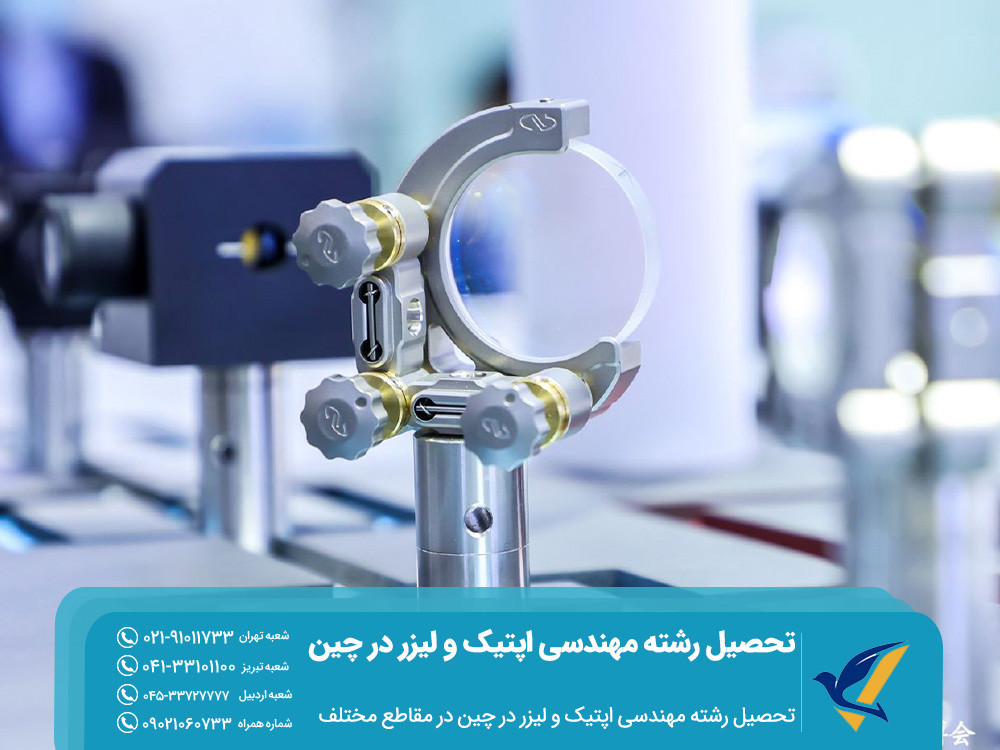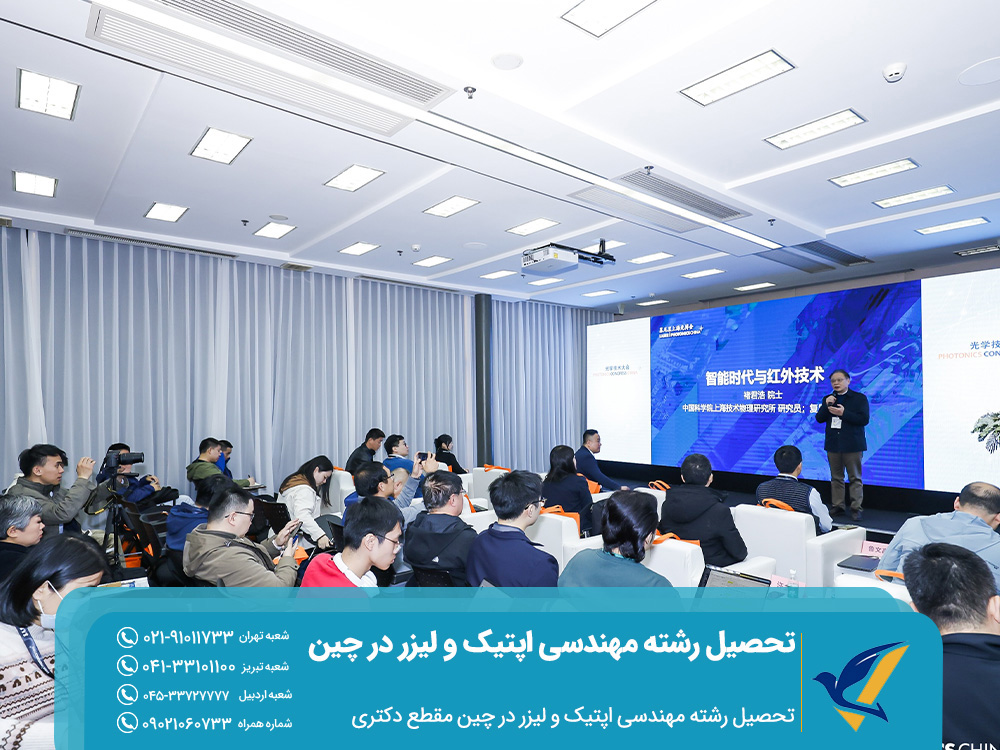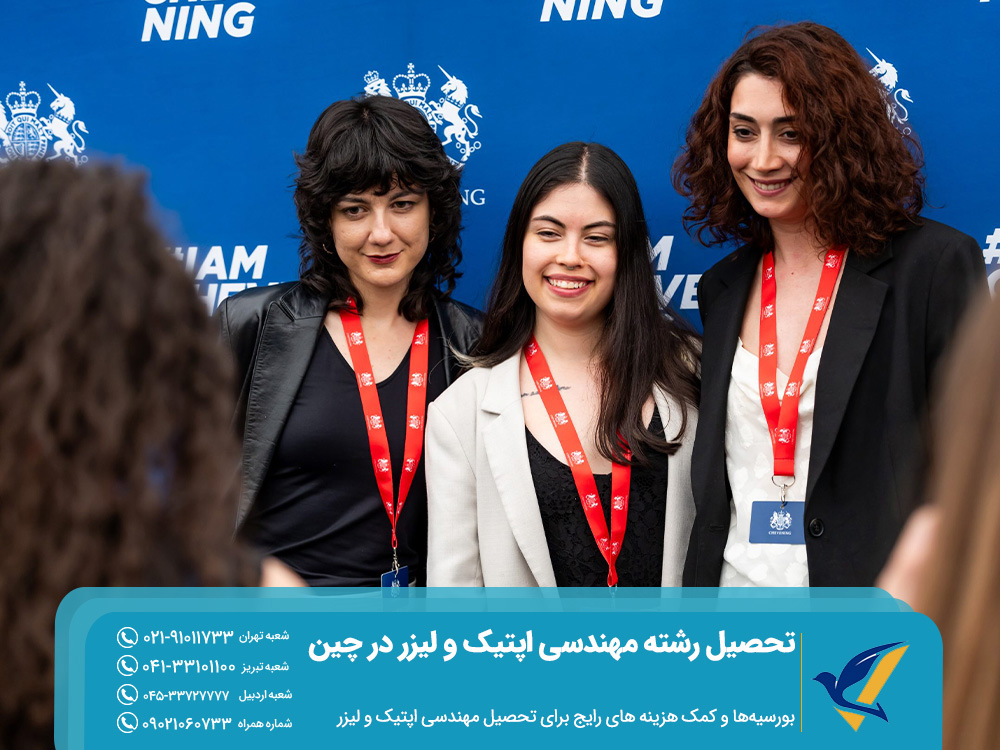Studying Optical and Laser Engineering in China has attracted significant attention from international students in recent years. China, with its remarkable advancements in optical and laser technologies, has created a scientific and advanced environment for professional education in this field. Carefully examining the cost of studying Optical and Laser Engineering in China also helps students plan their finances realistically and take advantage of scholarships and academic support opportunities.
Familiarity with the top universities in China for Optical and Laser Engineering also enables a more purposeful and future-oriented path for those interested in this field. To learn more about this discipline, stay with Elm Vira until the end of this article.
Introduction to Optical and Laser Engineering in China
Studying Optical and Laser Engineering in China has evolved into fields based on optics and information sciences, energy sciences, materials science, life sciences, space sciences, precision machinery and manufacturing, computer science, and microelectronics technology. Overall, studying this discipline in China covers many important emerging branches, including:
- Laser technology
- Fiber optic communication
- Optical storage and recording
- Optical information processing
- Optoelectronic displays
- Holographic and 3D imaging
- Thin-film and integrated optics
- Optical and fiber sensors, optical detection
- Laser material processing
- Low-light and infrared thermal imaging
- Photoelectric measurement
- Modern optical and optoelectronic devices and instruments
- Optical remote sensing technology and integrated optical engineering
These branches not only create a quantum leap in optical engineering but also promote the rapid expansion of modern optics and optoelectronics industries at an unprecedented scale.

Studying Optical and Laser Engineering in China at Different Levels
It is important to note that in recent years, in some key areas, information has expanded from the electromagnetic wave band to the optical wave band. The core of the modern optical industry now focuses on optical information, including acquisition, transmission, processing, recording, storage, display, and sensing. These industries generally feature digital, integrated, and microstructured technologies.
Traditional optical systems remain intelligent and automated, still playing a significant role in sensing, processing, and operational functions within micro-optical system research and development. Students pursuing Optical and Laser Engineering in China can continue their studies beyond the undergraduate level to graduate and doctoral programs.
1. Master’s Degree
The curriculum for a Master’s in Optical and Laser Engineering in China includes both foundational and specialized courses, as outlined below:
Foundational Courses:
- Applied optics and optical instrumentation
- Advanced physical optics, modern optics
- Optoelectronics
- Spectroscopy
- Quantum electronics
- Digital image processing and engineering mathematics
Specialized Courses for Master’s in Optical and Laser Engineering:
- Optical design
- Principles and technology of lasers
- Optical waveguides, thin-film optics
- Optical materials and technology
- Radiometry and colorimetry
- Fourier optics
- Optical information processing
- Nonlinear optics, quantum optics
- Principles of optical communications, measurement technology
- Detection and sensing
- Optical measurement and testing

2. Studying Optical and Laser Engineering in China – Doctoral Level
A doctoral degree is primarily focused on research related to professional courses. PhD research work involves dynamic reviews and international development perspectives. In other words, PhD students report on the progress of their research under the supervision of faculty advisors.
Related Fields and Specializations
Studying Optical and Laser Engineering in China is connected to several related disciplines in the field of optical sciences and technologies. Key related fields include:
- Photonics engineering
- Electrical engineering (electronics and telecommunications)
- Applied physics
- Nanotechnology
- Precision instrumentation engineering
- Materials engineering
These disciplines collectively focus on the study, design, and construction of optical systems, sensors, optical fibers, and laser applications in industrial and medical fields. Students combining theoretical knowledge with engineering skills gain the ability to work in research, production, and advanced technology sectors.
General Admission Requirements and Process for International Students
Basic Academic Requirements:
- Relevant degree (Bachelor’s for Master’s entry; Master’s for PhD) with a suitable GPA demonstrating a background in physics, electrical/mechanical engineering, or optical engineering.
Required Documents:
- Transcripts and official translations of previous diplomas/degrees
- Statement of Purpose (SOP) and recommendation letters from professors
- Language proficiency: IELTS or TOEFL for English programs; specific HSK level (e.g., HSK4 or above) for Chinese programs
- Research resume (for research-based Master’s/PhD) and, in some cases, sample papers or research proposals
- Health certificate, passport, photo, and application fee
Application Steps:
- Submit documents online via the university portal or international platforms (e.g., CUCAS or the university’s own application system)
- Preliminary review
- Interview or academic assessment (sometimes online)
- Upon acceptance, proceed with student visa application and on-campus registration

Top Universities in China for Optical and Laser Engineering
If you plan to study Optical and Laser Engineering in China, it is important to know that China has made significant investments in photonics and quantum sciences in recent years. Some leading universities with strong programs in optics, photonics, and laser engineering include: Tsinghua University, University of Science and Technology of China (USTC), Zhejiang University, Shanghai Jiao Tong University, Peking University, Harbin Institute of Technology, and University of Electronic Science and Technology of China (UESTC).
These universities are not only highly ranked in physics and optics but also maintain close collaborations with specialized research centers and industry laboratories. For research-focused or PhD applicants, USTC and Tsinghua University, due to their strong focus on photonics and quantum research, are often considered the best choices. The table below lists the top universities for students considering studying Optical and Laser Engineering in China:
| University |
City |
Approx. Annual Tuition (for International Master’s Students) |
Best For |
| Tsinghua University |
Beijing |
6,000–15,000 USD (depending on program) |
PhD / Research-focused |
| University of Science and Technology of China (USTC) |
Hefei |
4,000–12,000 USD |
PhD, Quantum Photonics |
| Zhejiang University |
Hangzhou |
3,000–12,000 USD |
Master’s / Research |
| Shanghai Jiao Tong University |
Shanghai |
4,000–14,000 USD |
Project-oriented / Industrial |
| Peking University |
Beijing |
4,000–12,000 USD |
Research and Academic |
| Harbin Institute of Technology (HIT) |
Harbin |
3,000–10,000 USD |
Engineering / Industrial |
| UESTC (University of Electronic Science and Technology of China) |
Chongqing |
3,000–10,000 USD |
Optoelectronics / Industrial |
Tuition Fees for Optical and Laser Engineering in China
As one of the hubs for research and production in optics, photonics, and quantum technologies, China offers Master’s and PhD programs in optics, photonics engineering, and lasers in both Chinese and English. Strong research capacity, industry collaboration, and relatively competitive tuition fees compared to Western countries make China an attractive option for studying Optical and Laser Engineering. Tuition fees for different levels are approximately as follows:
- Bachelor’s Programs: For programs specifically in “Optics/Photonics,” annual tuition for international students typically ranges from 2,000 to 8,000 USD; programs in English or at top-tier universities may be more expensive.
- Master’s Programs: Annual tuition generally ranges from 3,000 to 15,000 USD; high-level research- or project-focused universities (e.g., USTC, Tsinghua, SJTU, Zhejiang) may charge higher fees.
- PhD Programs: Depending on scholarships and contract type, tuition may be fully waived (with full scholarships) or range from 4,000 to 12,000 USD per year; many PhD students with CSC or university scholarships do not pay tuition.

Scholarships and Financial Aid for Studying Optical and Laser Engineering
There are several common pathways for students seeking financial support while studying Optical and Laser Engineering in China. One of the most widely used methods is receiving scholarships, including the following:
- Chinese Government Scholarship (CSC): Awarded by the Ministry of Education of China / Chinese Scholarship Council, this scholarship can cover tuition, insurance, monthly stipends, and even round-trip airfare. Many universities admit PhD and research-based Master’s students through this route. The application process typically involves registering on the CSC portal and then applying to the target university.
- University Scholarships: Major universities such as UESTC, USTC, Harbin Institute of Technology, and Beijing Institute of Technology usually offer financial packages for outstanding students (partial or full scholarships). These awards are often granted through the university’s international office based on the student’s research profile.
- Research and Project-based Scholarships: PhD students often work under professors on funded projects, which provide research funding and stipends (RA/TA). High-demand areas like quantum photonics or fiber-optic communications have strong financial support from government and industrial projects.
- Erasmus or International Exchange Scholarships: In cases of international university collaborations, there are opportunities for short-term exchanges or joint funding.
Practical Advice: Apply early for CSC or university scholarships (deadlines are usually in the first months of the calendar/university admission cycle) and prepare a strong research resume and proposal.
Career Outlook for Optical and Laser Engineering
Optical and laser engineers apply the principles of optics to research, design, and develop applications across various fields. As mentioned, optics studies the properties of light and its interaction with matter, combining elements of physics and engineering. Students in China learn how to generate, transmit, detect, and measure light to develop devices and technologies that utilize these capabilities.
The demand for optical engineers is expected to grow significantly over the next decade, as fields relying on optical technologies continue to expand. Fiber optics in telecommunications is rapidly growing, creating opportunities in communications and computing industries. Emerging fields in medical and defense applications are also developing, while increasing automation in manufacturing provides further avenues for students to apply and expand their expertise in optical and laser engineering.

Average Salary (Job Market After Graduation)
Salaries in China vary depending on the city, industry (academic research, optical component companies, telecommunications, industrial lasers, quantum technologies), and work experience. Job market data indicate:
- Estimated average annual salary for an Optical Engineer: ~¥300,000–¥370,000 CNY per year (approximately $40,000–$55,000 USD, depending on exchange rates). Entry-level positions are at the lower end, while senior roles earn more.
- Reports from major cities (Beijing, Shenzhen, Shenyang, Guangzhou, Shanghai) show higher wages. Innovative private industries (laser, semiconductor, fiber-optic companies) often offer competitive salary packages and research benefits. Actual income depends on the position, technical skills (e.g., optical system design, software simulation, laser fabrication and testing), Chinese language proficiency, and industrial experience.
Practical Tips for Applying and Succeeding in China
Students planning to study Optical and Laser Engineering in China should consider the following points:
- If you aim to pursue research (PhD), contact relevant professors in advance via email and send a research proposal or idea. Having related publications or projects increases the chances of receiving funding.
- If you do not speak Chinese, look for English-taught programs at top universities; however, basic knowledge of Chinese (HSK) is very useful for daily life and industrial internships.
- To secure CSC or university scholarships, monitor official university websites and the CSC portal for deadlines and application schedules.
- Attending conferences and networking with professors and industry professionals in China can shorten the path to post-graduation employment.
- When choosing a university, consider a combination of research reputation, active faculty in optics/laser fields, city location (industry access), and financial conditions.
Conclusion
Studying Optical and Laser Engineering in China offers a valuable opportunity to gain specialized knowledge in one of the fastest-growing technology fields worldwide. By carefully examining tuition costs and selecting from the top universities in China for Optical and Laser Engineering, students can create a scientific, practical, and international pathway for a successful professional future.
If you are interested in studying this field in China, you can simplify your journey by receiving free consultation from the experts at Elm Vira Immigration Institute.
میانگین امتیازات 5 از 5
Vote count: 1 Vote